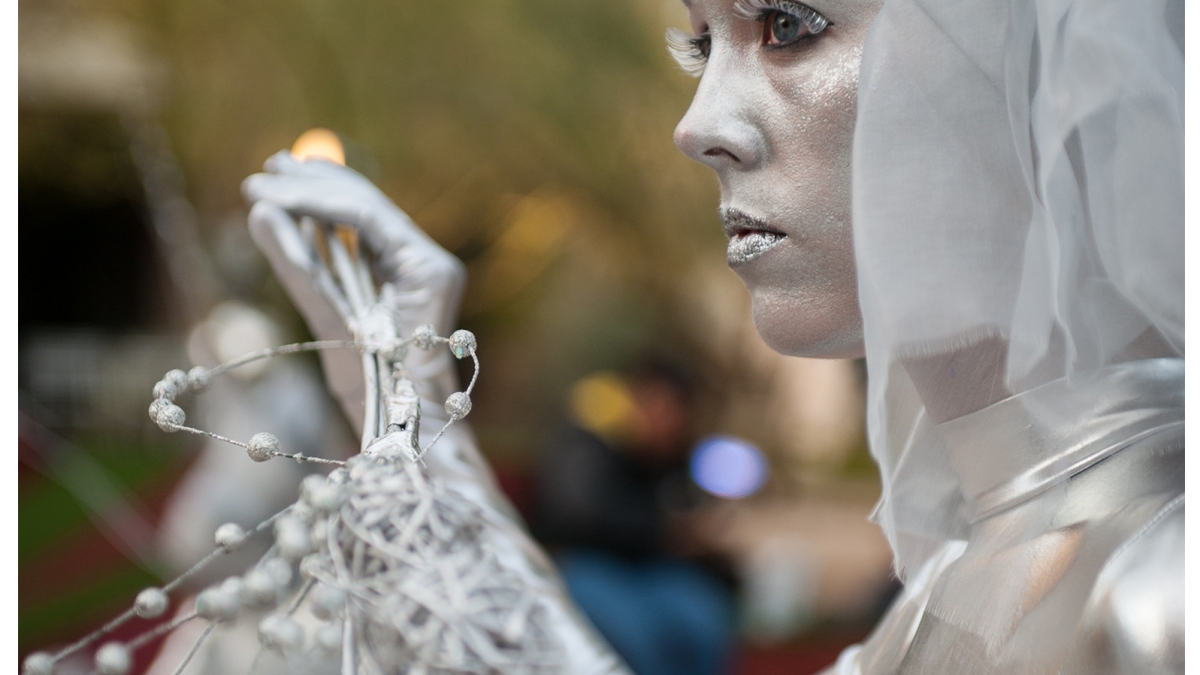A carnival of the future: Emerge 2014 to explore what lies ahead

Dancing industrial robots. Singing drones. Aerialists, clowns and experimental musicians. All of this and more will be part of ASU's Emerge 2014: The Carnival of the Future, slated for Friday, March 7, in the heart of downtown Phoenix. Emerge is an annual event that unites scientists, artists, engineers and futurists through spectacular, interactive displays and performances.
Emerge is an opportunity to think in radically creative ways about the future and our place in it, says Ed Finn, co-director of Emerge and director of ASU’s Center for Science and the Imagination. “The future is going to be a strange place, so a carnival is the perfect environment to explore the possibilities in a playful, improvisational way that’s still grounded in real science, real technology and real ethical questions,” Finn says.
This year's event will feature a giant circus tent in the heart of downtown Phoenix, with scores of performers and more than a dozen immersive, interactive environments under the big top. Visual projections, 3D printing, bio brain scans, audio delights and games from the future, such as "Test the Strength of Your Ego," will be part of the fun.
This year's theme is “The Future of Me” – exploring the challenging definition of individuality in contemporary society. Individuals have never had so much power – from Edward Snowden challenging nation states, to Bill Gates personally deciding to eradicate polio. Medicine is personalized, learning platforms are personalized and entrepreneurs run global businesses out of their smartphones. At the same time, individuals have become nothing more than tiny motes in networked systems that are so staggering in complexity as to be beyond understanding, much less control. The idea of individual human agency seems fanciful in a world of big data and ubiquitous surveillance.
Emerge 2014 challenges artists, scientists, designers, storytellers, ethicists, humanists, makers and futurists to explore questions of individuality, autonomy and freedom, as well as control, automation and facelessness.
Are we on the verge of the triumph of the individual? Are we building a future dominated by systems, where self-determination is only a memory? Or, inevitably, is something more complicated afoot?
To find out the answers to these questions, and to confront a whole host of thought-provoking and challenging experiences of the future – from “Receiving Messages From Our Future Selves” to “You, Me and Death” – visit Emerge 2014: The Carnival of the Future under the big top on Friday, March 7, near ASU’s Downtown Phoenix campus, and at emerge.asu.edu.
“You can’t have better futures without better dreams,” says Emerge co-director Joel Garreau, from the Sandra Day O’Connor College of Law. “And if you’re going to dream, dream big. That’s what this carnival is for.”
Emerge 2014 will take place on the corner of 3rd Street and Garfield, just south of Roosevelt Street. It is part of Phoenix’s Artlink Art Detour, the largest public art walk in the country, attracting tens of thousands.
In the gallery
From March 7-9, Emerge will also host a forensics lab recreating the process of envisioning the Future of Me, and turning speculation into reality. This exhibition of evidence will be showcased at the ASU International Artist Residency Program Gallery at Combine Studios, located at 821 N 3rd St, Phoenix, AZ 85004. Expect to see photos, text, video and audio documenting the process of creating the performances, installations and experiences showcased under the big top on March 7.
“Our creative teams have undergone an intense collaborative process to build experiences and performances for Emerge,” says Cyndi Coon, an Emerge co-director and faculty associate in ASU’s School of Art. “This is an opportunity to celebrate process as well as the dazzling final products that you’ll see under the big tent.”
Sponsors
Emerge 2014: The Carnival of the Future is generously sponsored by the broadest spectrum of ASU colleges, schools and research centers, as well as Verizon Wireless. The ASU partners include the Ira A. Fulton Schools of Engineering, Herberger Institute for Design and the Arts, Lincoln Center for Applied Ethics, Center for Science and the Imagination, Global Institute of Sustainability, LightWorks, School of Earth and Space Exploration, Consortium for Science, Policy and Outcomes, Biodesign Institute and Sandra Day O’Connor College of Law. To learn more about our sponsors, visit http://emerge.asu.edu/sponsors.
Location
Cost: All events are free and open to the public
Public contact: http://emerge.asu.edu
Media contact: Cyndi Coon, cyndi.coon@gmail.com